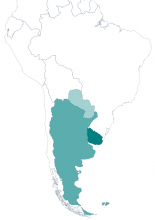José Agustín Potenza was born in the Argentine capital of Buenos Aires on 23rd April 1928. He was a musician and played the accordion, piano, drums, and organ. From a young age, he became involved in the Peronist Youth and participated in political activism and trade unionism from the 1950s.
For some time, he worked as a librarian at the Library of the Congress in Argentina before a decree passed by the Argentine dictatorship made him redundant in April 1976. He was in a relationship with Rafaela Giuliana Filipazzi Rossina and separated from his first wife with whom he shared four children. Rafaela was an Italian citizen and an Argentine national. She had arrived in Argentina when she was one years old with her family who was escaping fascism and the Second World War.
In light of the recent coup d'état and José's redundancy, the couple decided to leave Argentina. They spent some time in Uruguay, Paraguay, and Brazil before settling in Montevideo during early 1977. On 26th October 1976, the Policía de la Capital (Capital Police) in Asunción detained Potenza, Filipazzi, and five other foreign citizens and deported them to Argentina, according to documentation held at Paraguay's Archive of Terror.
On 27th May 1977, the couple was captured at the Hermitage Hotel where they were staying in Montevideo's Pocitos district. Their capture was a coordinated operation between Uruguayan and Paraguayan repressors under the framework of Operation Condor. They were transferred to the Fusileros Navales (Marine Corps, FUSNA) clandestine torture and detention centre situated at Montevideo's port. In 1977, the FUSNA's intelligence operations were under the leadership of Jorge Tróccoli, who was condemned by the Italian Condor Trial, and Juan Carlos Larcebeau, also condemned for crimes against humanity in Uruguay.
José and Rafaela remained in this clandestine centre until they were transferred to Paraguay on 8th June 1977. The Uruguayan repressors handed them over to Paraguayan police officers who had travelled to Montevideo, especially to bring the couple to Asunción via a commercial flight.
Once they landed in Paraguay, they were taken to the Police Investigations Department which functioned as a clandestine detention centre. The couple was held there for several months until at least December 1977. Since her capture, Rafaela was able to send some letters to a friend via a police officer who acted as a messenger. The final letter was dated November 1977. Some documents and testimonies suggest that José was possibly transferred to Emboscada Prison and Rafaela was taken to the Asunción women's prison, El Buen Pastor.
In August 2016, bone remains were identified belonging to José Potenza, Rafaela Filipazzi, and two disappeared Paraguayan militants, Miguel Ángel Soler and Cástulo Vera Báenz. Repressors had captured the second Paraguayan militant in the Argentine city of Puerto Iguazú, which borders Paraguay, under the framework of Operation Condor. Their remains were found in 2013 in a pit situated in the police training centre, known as the Agrupación Especializada, in the Paraguayan capital of Asunción.
Their remains were identified thanks to DNA matching with the victims' children carried out by the Directorate of Historical Memory and Reparation of the Paraguayan Ministry of Justice's General Directorate of Human Rights and the Argentine Forensic Anthropology Team.
The Italian Condor Trial investigated the crime in 2019. Through this trial process that had begun in Italy in 1999, Speranzoni presented new information held in the Uruguayan military archives. This allowed a new case to be opened in July 2022 before the Rome tribunals that are currently investigating the homicides of José Potenza and Rafaela Filipazzi in Paraguay and Elena Quinteros in Uruguay.

